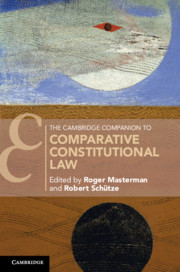Book contents
- Reviews
- The Cambridge Companion to Comparative Constitutional Law
- Cambridge Companions to Law
- The Cambridge Companion toComparative Constitutional Law
- Copyright page
- Contents
- Notes on Contributors
- Acknowledgements
- Table of Cases (Selection)
- Abbreviations
- Introduction
- Part I Theoretical Foundations
- Part II Historical Experiences
- 3 The United Kingdom Constitution
- 4 French Constitutional Law
- 5 US Constitutional Law and History
- 6 The Constitution of the Republic of India
- 7 The Constitution of China
- Part III Constitutional Principles
- Part IV State Institutions
- Part V Transnational Constitutionalism
- Index
- References
4 - French Constitutional Law
from Part II - Historical Experiences
Published online by Cambridge University Press: 30 September 2019
- Reviews
- The Cambridge Companion to Comparative Constitutional Law
- Cambridge Companions to Law
- The Cambridge Companion toComparative Constitutional Law
- Copyright page
- Contents
- Notes on Contributors
- Acknowledgements
- Table of Cases (Selection)
- Abbreviations
- Introduction
- Part I Theoretical Foundations
- Part II Historical Experiences
- 3 The United Kingdom Constitution
- 4 French Constitutional Law
- 5 US Constitutional Law and History
- 6 The Constitution of the Republic of India
- 7 The Constitution of China
- Part III Constitutional Principles
- Part IV State Institutions
- Part V Transnational Constitutionalism
- Index
- References
Summary
This chapter aims at providing readers with an introduction to French constitutional law and, more generally, to France’s constitutional tradition. France’s constitutional culture is dominated by a paradox: it is a revolutionary culture with frequent constitutional changes and amendments, but also some remarkably stable key characteristics. Amongst these is the establishment of a republican culture in a country governed for centuries by monarchs. This may explain France’s very special position with regard, in particular, to systems of government. While France chose parliamentarism during the nineteenth century, the 1958 Constitution – an embodiment of the ideas of General de Gaulle – is characterized by an insistence on presidential powers that many observers compare with a presidential monarchy. This is just one, albeit maybe the most conspicuous, of France’s constitutional paradoxes.
- Type
- Chapter
- Information
- The Cambridge Companion to Comparative Constitutional Law , pp. 92 - 112Publisher: Cambridge University PressPrint publication year: 2019

